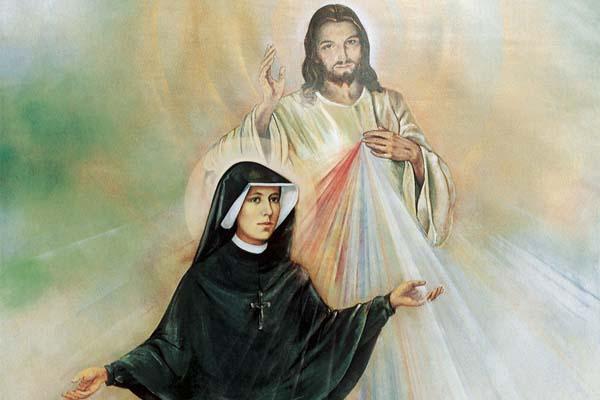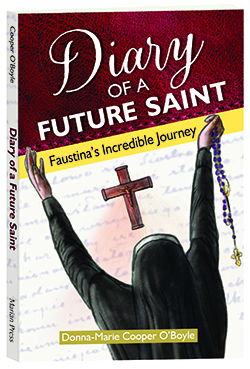
Saint Faustina prayed with great trust for souls, knowing that God wanted them to be saved even more than she did, and knowing also that souls do actually depend on our prayers for the grace they need to accept salvation from Christ. Her feast should be a time to make her prayer our prayer, and to ask her intercession for us and for the whole world.
By Chris Sparks
It's the feast day of St. Faustina on Oct. 5, and that is always cause for celebration, especially here at the National Shrine of The Divine Mercy.

Afterwards, from 12-1 pm in the Divine Mercy Gift Shop, Donna-Marie will sign copies of her new Marian Press biography of St. Faustina, Diary of a Future Saint: Faustina's Incredible Journey.
Faustina's mission continues
The mission of St. Faustina continues to succeed in ways that the saint prophesied, and yet could probably hardly imagine. She had visits from St. Thérèse of Lisieux, the Little Flower (feast day: Oct. 1), who told Faustina that she, too, would be a saint, just like Thérèse (see Diary of Saint Maria Faustina Kowalska, 150). Saint Faustina has certainly lived up to that prophesy.
Saint Thérèse has been and continues to be one of the most beloved of all saints, for all that she lived and died in the 1800s. She wrote comparatively little in her lifetime, but what little she did produce is an incredible spiritual treasure. Similarly, St. Faustina lived and died in the 1900s, and yet for all that she’s only been a saint for a short period of time, firmly in the modern era, she’s also become one of the most beloved of all saints. Her Diary has changed the lives of millions around the world and become one of the most read of all the classic Christian works of mysticism.
Singular triumph
Faustina foresaw her own canonization (see Diary, 1044-1048), as well as the difficulties and eventual triumph of the message and devotion of Divine Mercy in the Church (see Diary, 378, 1689). Her canonization and the establishment of Divine Mercy Sunday in the great Jubilee Year 2000 marked a singular triumph; the universal establishment of St. Faustina’s feast day simply confirms it, and will be another means of spreading the message and devotion of Divine Mercy across the world.
Like leaven being kneaded into a lump of dough, the message and devotion of Divine Mercy brings light and freedom into the Christian life, reminding the faithful that “God so loved the world that he gave his only Son, so that everyone who believes in him might not perish but might have eternal life. For God did not send his Son into the world to condemn the world, but that the world might be saved through him” (Jn 3:16-17).
All is grace
Jesus, through St. Faustina, has renewed in the Church the sense that all is grace. His mercy is manifest through creation, redemption, and sanctification alike. He will come as the Just Judge some day, but now is the time of mercy; now is the time of repentance and renewal.
All things are possible by the mercy of God, and the only unforgivable sin is to believe that God cannot forgive us, that our sins somehow put us beyond His love and mercy (see Catechism, 1864). So long as we accept His forgiveness, invite His love, and live trust in Jesus, we may have great hope for our salvation.
That was the message to which St. Faustina devoted her life. She united her sufferings to Christ’s sufferings on the Cross and offered them for the salvation of sinners. She prayed with great trust for souls, knowing that God wanted them to be saved even more than she did and knowing also that souls do actually depend on our prayers for the grace they need to accept salvation from Christ (see Diary, 1777). Her feast should be a time to make her prayer our prayer, and to ask her intercession for us and for the whole world.
We all need prayer
We are often the sinners who need prayer, and so should pray all the more fervently for our brethren inside and outside of the Church who are captive to their own sins and vices, who fall through temptation by the world, the flesh, and the devil. We should pray for those outside the Church, often through no fault of their own.
We should pray for those who have not heard the Gospel and do not know there’s hope for forgiveness of sin. We should pray for those who have come before us, who are in Purgatory now, awaiting the fullness of their purification from sin. And we should pray for those to come, that our children and children’s children may live in a world marked more by grace than by sin, more by forgiveness than by malice, and more by peace than by the strife that comes through sin.
Saint Faustina, pray for us who have been so touched and affected by the Divine Mercy message and devotion. Pray for us sinners, now and at the hour of our death, and pray for all the sinners who have never heard of the mercy of God, especially those who do not know Jesus.
Saint Faustina, your mission has succeeded beyond any natural expectation, and yet it’s got so much farther to go. Pray for all of us here below who still work in the vineyard, and help us with your prayers. Pray for us, St. Faustina, for we who proclaim Divine Mercy are often the ones most in need of it.
Jesus, I trust in You!
{shopmercy-ad}

















